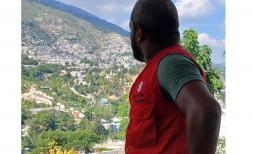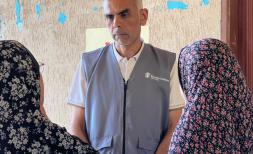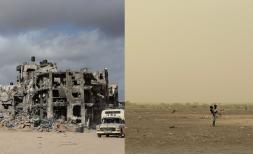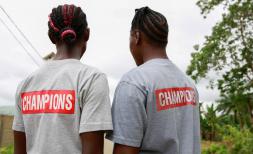Coronavirus and children’s rights: It’s time to act on fair finance
Global financing is a key pillar of Save the Children's Agenda for Action to #ProtectAGeneration throughout the coronavirus pandemic.
Our world is at a crossroads, and the challenge we’re facing is unprecedented. From closed schools and overburdened health systems, to heightened food insecurity and family poverty, the virus is impacting nearly all aspects of children’s lives. And this is on top of existing crises and challenges.
Although we are all feeling the effects of COVID-19, they are not felt equally around the world. The pandemic will hit developing countries, and vulnerable people and children the hardest.
When containment and mitigation measures came into place in earlier this year, people around the world lost their livelihoods,[1] businesses and incomes almost overnight. The UN estimates that the global economy may lose a staggering $8.5 trillion over the next two years, and that the pandemic will push 34 million people into extreme poverty in 2020 alone.[2] On top of that, estimates from Save the Children and UNICEF show that over 80 million more children are likely to live in household poverty at the end of this year.[3]
Children are directly and indirectly affected by these enormous shocks – their schools and playgrounds have closed down, and in many cases their parents have lost their income.
Priscovia, a child representative speaking on behalf of children in a Pan-African dialogue with decision makers, explains: “We are children, we like to play with our friends but since coronavirus came along. We cannot play anymore and when a child gets sick, parents will not be allowed to stay with the child in the hospital. Children are also begging in the streets because their parents have lost their jobs.”
Lockdown measures have pushed markets into extreme turmoil, with a sharp downturn in commodity prices; decreasing foreign investments in developing countries; drops in remittances; disrupted supply chains; a significant reduction in tourism, and borrowing costs have increased, to mention a few.
In short, public revenues and private incomes have fallen away in the blink of an eye.
Simultaneously, public expenses are increasing as societies struggle to adapt to the COVID-19 reality – with measures to protect and scale up their health systems, and efforts to create or expand social safety nets in the face of growing unemployment.
Many developing countries lack the resources to adequately respond to the pandemic and its effects on society. Prior to the pandemic many had weak health systems, insufficient social safety nets, and less space to provide an adequate fiscal and monetary response to counteract recession or mitigate the consequences of a lockdown.
Additionally, taking up loans to strengthen national budgets is a risky option. Even before coronavirus, almost half of low-income countries were in debt distress or at high risk of debt distress[4]. The last decade’s rapid build-up of sovereign debt[5] has put many countries at a financially vulnerable starting point to handle COVID-19, and debt servicing continue take up a sizeable portion of developing country governments revenue. Money which could otherwise be used to respond to and counteract the health, social and economic crises.
The picture is bleak. It’s not an exaggeration to say that the fight for a just and sustainable world, where children survive, are safe, able to learn, and have their rights fulfilled, is a much steeper hill to climb than just a few months ago.
Sharmin, a frontline healthcare worker provides family planing counselling at Save the Children's Primary Health Care Centre in Cox's Bazar, Bangladesh.
Fortunately, the solutions are still within our reach if governments take decisive steps not only to increase the volume of resources available, but also to ensure that they are allocated to reach the most marginalized children.
We are calling for a comprehensive response by governments and the global community to make available the financing needed to respond, recovery and build back from the pandemic. Delayed or inadequate action to contain and respond to the virus and the economic recession risks a break-down of health systems across many vulnerable developing countries and massive social and economic consequences. Insufficient action may lead to decades of hard-claimed progress on human development being wiped out, with a devastating and disproportionate impact on children and future generations.
All governments and the global community must step up. The coming months give our leaders a unique opportunity to get it right on fair finance and on public investment in children.
Here’s what we’re calling for:
1. Governments must ramp up public spending to deliver on children’s right to survive, learn and be protected
Governments and development partners must ensure that the additional financing and fiscal response to COVID-19 protects and promotes human rights, and that a greater proportion of domestic budgets are spent on public social sector and protection measures during and in the aftermath of the crisis.
We already know the best ways to fulfil children’s rights, and they must now be prioritized: in addition to adequate fiscal stimulus and support to protect businesses and jobs, countries across the world will need to undertake massive investments in universal public healthcare and abolish user-fees to ensure everyone has the same access to quality healthcare; there needs to be a global expansion of social safety nets and universal child benefits to support families who’ve had their incomes disappear overnight; there is need for public investment to protect education and get children back to school; and there needs to be investments in child protection service. It is paramount that any response must help mitigate the disproportionate impact of the virus on women and girls, and ensures the rights and well-being of the poorest and marginalized populations without discrimination.
2. Donor countries must meet long-standing aid commitments, and prioritize support towards health, education, child protection and social protection
Developing countries, and especially those hardest hit by the pandemic, require urgent support to strengthen the capacity of national health care systems, education and social security capacity.
The long-held commitment which was reaffirmed by rich countries in the 2030 Agenda for Sustainable Development and the UN Financing for Development agreement, has only been met by a handful of countries. If more donor countries met their aid commitments, this could mean massive additional finance could be made available to respond to the pandemic and its consequences: if the richest countries had actually met their long-held commitments to spend 0.7% of their gross-national income on aid, it could mean nearly USD 200 billion more for international development efforts.[6] Furthermore, aid to health, education, and protection have fallen as a share of total aid over time (between 2010 and 2018). There needs to be an increase in aid towards the poorest countries and to sectors that are crucial to support social and economic recovery for the most marginalized people.
3. Cancel debt so that developing countries can prioritize human rights over debt payments
When the crisis hit, we joined our voice with that of many others around the world in calling for urgent action on debt. In 2020 and 2021, low-income countries were expected to spend over USD 50 billion in debt servicing to bilateral, multilateral and private creditors.[7] Cancelling those payments would provide the countries with a much-needed economic breathing room.
Our initial call for action sparked a much-needed response: in April, the G20 governments agreed to a time-bound debt moratorium (suspension) for 2020, with the G7 following suit. The IMF is taking action to delete debts owed to them by the poorest countries. While this is a welcome first step, it is not enough. It must be followed by a debt cancellation for the countries that need it most, more countries must be covered by the moratorium, and all creditors must take part – including multilateral, bilateral and private creditors.
This needs to be a decade for action on financing for development.
These calls to action are crucial building blocks to enable countries and children to respond and recover from the pandemic, but they are far from enough to get us on track to achieve the 2030 sustainable development goals (SDGs).
Coming out of this crisis, every country needs to step up their efforts to increase domestic and international finance for the SDGs. Domestic revenue, especially from tax, will continue to be the most significant and sustainable source of revenue for governments to finance public spending on children, and we need to see rapid movement to increase tax revenues in a progressive way and to close loopholes that allow for money to disappear in corruption, tax avoidance and tax evasion. In the longer term, progress is needed on the ambitious commitments found within the 2015 global Financing for Development agreement, the Addis Ababa Action Agenda to address and tackle the global systemic challenges that have left countries vulnerable and unable to provide the response needed.
Without significant global action on debt, aid and social sector spending, the poorest and most vulnerable children will continue to be those that suffer most from the devastating impacts of this global pandemic.
All over the world, Save the Children is rapidly adapting our existing work whilst preparing for outbreaks of coronavirus in countries with limited capacity to respond.
Find out more about Save the Children's coronavirus response.
[1] https://www.ilo.org/global/about-the-ilo/newsroom/news/WCMS_743036/lang--en/index.htm
[2] https://www.un.org/development/desa/dpad/wp-content/uploads/sites/45/publication/WESP2020_MYU_Report.pdf
[3] https://www.unicef.org/press-releases/covid-19-number-children-living-household-poverty-soar-86-million-end-year
[4] https://www.imf.org/en/About/Factsheets/Sheets/2016/08/01/16/39/Debt-Sustainability-Framework-for-Low-Income-Countries
[5] https://developmentfinance.un.org/sites/developmentfinance.un.org/files/FSDR_2020.pdf?_ga=2.30035199.1359267250.1591732270-2051274770.1585039958
[6] Member governments of the OECDs Development Assistance Committee (DAC) spent 0.31% of their gross national income (GNI) on aid in 2018, far short of the commitment to spend 0.7%. If all DAC-donors had met their minimum commitment of 0.7% 2018, it would have meant an extra USD 196 billion more available for global development efforts.
[7] https://www.eurodad.org/debt_moratorium







